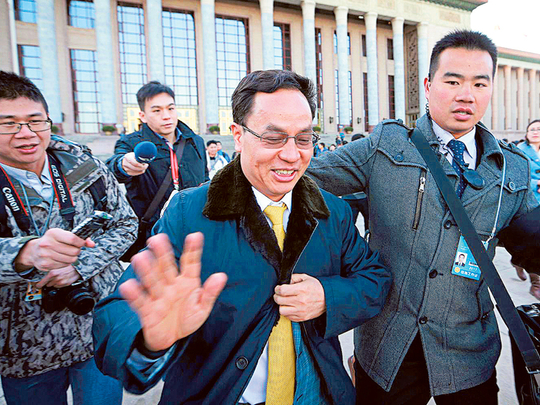
London: What can a bank offer the successful chief executive who has just listed his company and become a multimillionaire or billionaire?
For financiers in Asia chasing closer ties to the region’s wealthiest people, the answer is proving simple enough: cash to bet on China’s soaring markets.
Financing tycoons is a lucrative and growing business in Asia that is tempting investment banks including Goldman Sachs and Morgan Stanley to muscle in. They join a crowded field of existing players such as UBS, Credit Suisse and Citigroup, which all have big private banks.
Lending on margin to retail investors is the rocket fuel powering the soaring markets in Shanghai and Shenzhen. Financing tycoons works on the same principle — banks make loans using shares as collateral and borrowers can be asked to top up if values fall — but the sums involved can be more than $1 billion (Dh3.67 billion) a pop.
One senior investment banker calls it “one of the last juicy products out there”.
Banks everywhere lend on margin to hedge funds and private equity but in Asia, the rise of first and second-generation wealth makes tycoon financing a particularly attractive regional business because company founders can be worth billions on paper yet be short of hard cash.
“These companies are their babies but there’s a real need for these entrepreneurs to raise liquidity — and that’s what causes all these other banks to want to get into the business,” says one long-time specialist.
Li Hejun, China’s richest man by some counts until the share price of his listed company Hanergy Thin Film spectacularly collapsed last week, is a case in point. Filings unearthed by the Financial Times show he pledged shares worth HK$5.8 billion ($747 million) for a $200 million loan just before the 47 per cent price fall.
The latest tycoon-financing twist is lending for new investments, often generated by the bank doing the lending. “In Hong Kong, where we are seeing a lot of private placements, block trades and [floats], there is a real demand for this type of quick and opportunistic financing” says Sue Lee, Citi’s head of strategic equity solutions business for Asia Pacific.
Providing tycoon financing can also help investment bankers win particular deals. Morgan Stanley managed a coup in this respect when last year it snatched the mandate for a $4.7 billion private placement of shares in Ping An, the insurer, from Goldman and Credit Suisse at the very last minute.
The victory came because it offered enough financing to a tycoon in the 10-strong syndicate to help raise the price the whole group paid for the deal.
Putting one over on your rivals is always nice (and rare, in a deal of that size) but tycoon financing hits another banking sweet spot, namely making money by bringing together private bankers and traditional dealmakers.
In theory, investment bankers unselfishly introduce newly-minted millionaires, post-float, to their private banking colleagues. They in their turn, bring in the investment banking team to advise on a tycoon’s dealmaking.
Real relationships are rarely that smooth, but finding a way for the investment bank to satisfy a private client’s need for funds to bet on shares is a quick win for both sides.
Coalition, the data provider, estimates that in the past two years, revenue from so-called corporate equity derivatives in Asia has totalled $1.2 billion, up from $96 million in 2012.
The growth has been fuelled by the rise of private wealth, particularly in China, with the floating of companies such as Alibaba. “The whole market dynamic is shifting from state-owned to private enterprises so you have this massive conversion of wealth and these entrepreneurs, after they float, are looking for liquidity,” said Aaron Oh, head of corporate equity derivatives for Asia Pacific at Credit Suisse.
Typically banks will advance cash worth about 30 per cent of the borrower’s portfolio, but competition is reportedly spurring banks to lend up to double that.
Backing tycoons in the bullish Chinese market is unlikely to keep bankers awake at night. Investors too are buying into the concept at a retail level: China’s brokerages have raised equity worth $14 billion in Hong Kong this year and plan to use much of it to fund more margin financing.
The real question is what will happen when markets suffer a correction. Retail investors may have trouble meeting the resulting margin calls. Tycoons should be better able to keep their cool, so long as their bankers do too.
Financial Times












